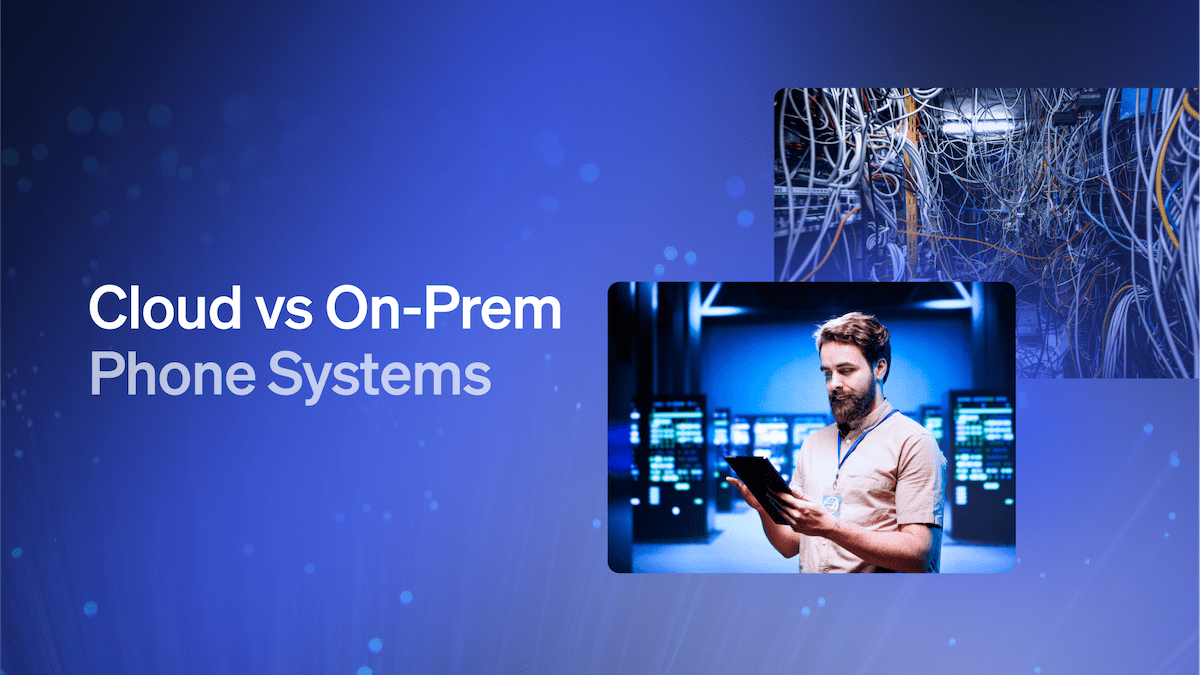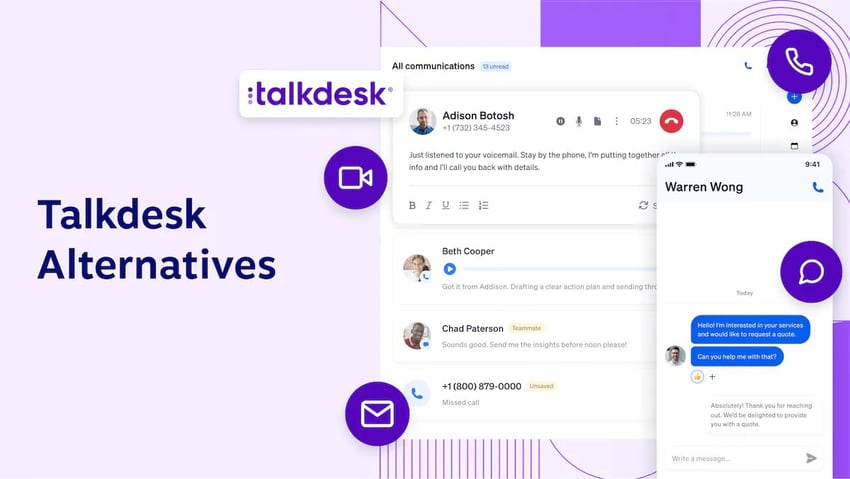Looking to upgrade your company’s phone system to something more reliable, easy to use, and cost-efficient?
Although there are several options to choose from, chances are you’ve whittled it down to a premise-based or cloud-based system.
There are advantages and disadvantages of running your business phone systems on-premise or hosting it in the cloud. That’s what makes it such a tough but important decision. But choosing the right one for your needs can make your business communication stress-free.
In this article, we’ll share the pros and cons of both options. By the end, you’ll have a much clearer picture of which telephone system fits your unique requirements.
What Is an On-Premises Phone System?
A premise based phone system is one that is physically installed in a building.
It either consists of physical wires around the office, which connects your office’s data center to employee desk phones, or uses IP technology, which allows you to make calls through an internet connection. Either way, the main PBX system is inside your physical workspace.

Premise based phone systems can be expensive to set up because of the equipment needed. For example, you’ll need IP phones and SIP trunking – not to mention a dedicated room in your office for the equipment.
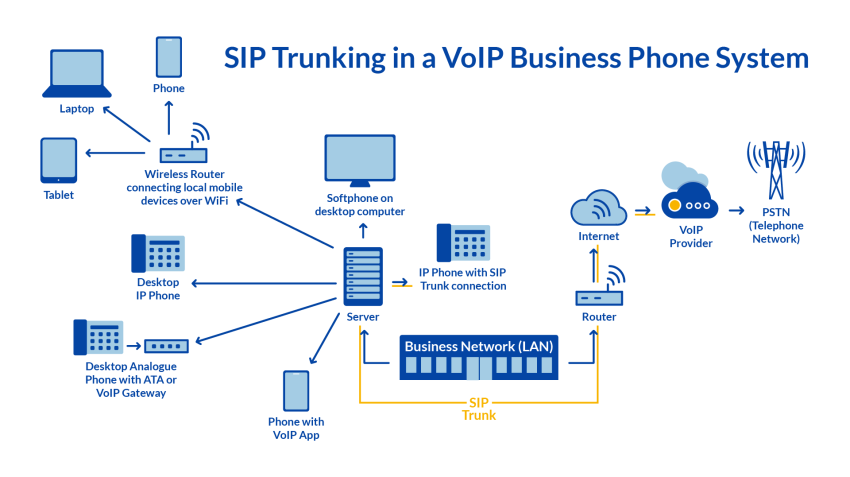
Plus, maintenance is inevitable. You’ll either need your own IT team or a third-party service to come in and repair any problems. These additional costs can be expensive for your business.
There’s also a lack of flexibility that comes with a physical PBX phone system: Anyone needing to make calls needs to physically be in the office. Remote employees can’t dial in and make or receive calls away from their desks.
What Is a Hosted Cloud Based Phone System?
A hosted phone system functions similarly to an on-premise solution. The only difference is that calls are made using an existing internet connection. This gives you a lot more flexibility and freedom that you don’t have with an old-school setup.
This means that cloud phone systems are usually cheaper than their alternatives because all you’re paying for is the connection to be set up. And since that connection is made through the internet using a Voice over Internet Protocol (VoIP) solution, it’s much quicker to get up and running.
Here’s a quick look at how a hosted VoIP phone system works:
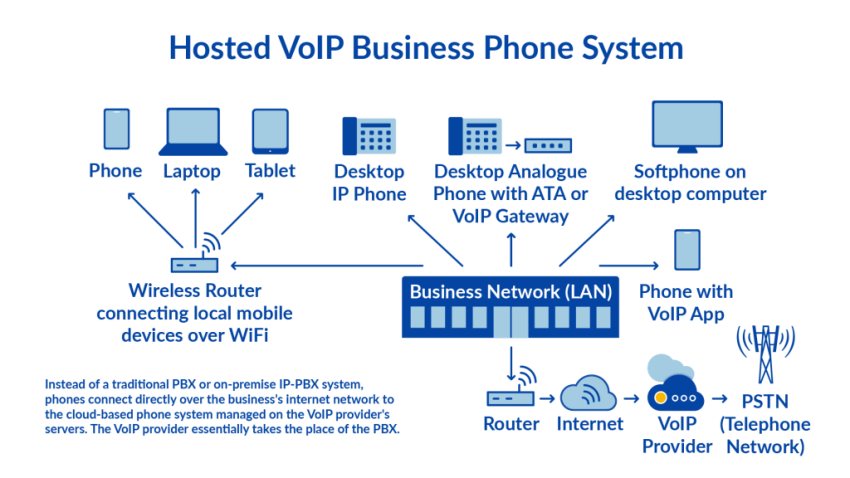
But one of the biggest differentiators between on-premise and cloud phone systems is the fact that remote teams can use the hosted solution. They’re not tethered to a desk phone. Team members on the other side of the world can still make phone calls and join conferences, so long as they’ve got compatible VoIP software installed on their device.
Speaking of which, you’ll still be able to use your normal, everyday equipment. You don’t need a special IP phone or hardwired desk phone to use a cloud phone system. Simply download the provider’s app onto a laptop, mobile device, or VoIP conference phone to start taking calls.
And if you’d prefer new equipment, VoIP headsets are a great option. They provide clear and crisp sound, and cordless ones have incredible range. You can take a walking phone call, or sit on the other side of the office and still have a crystal clear connection.
VoIP desk phones are both powerful and easy to use. They provide mobility not seen in a traditional phone system. Your team in the office can physically take their phones to multiple locations, like home or on the road, and continue working without any interruption.
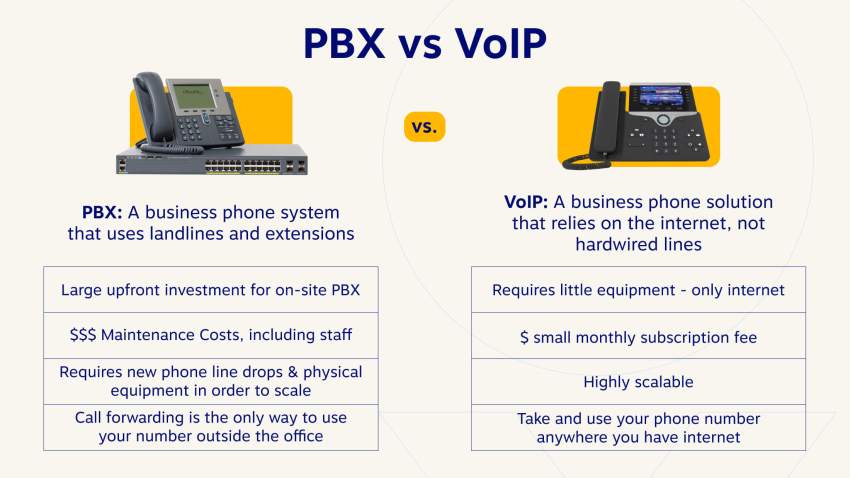
On Premise vs. Cloud Phone Systems: Pros and Cons
Now that we have a better understanding of both telephone systems, let’s review some of the key differences between the two.
Costs and maintenance
It’s your responsibility to maintain an on-premises solution after the lengthy and expensive setup is finished. Costs and maintenance associated with the upkeep of an on-premise system is one of the main points we touch on in our video:
Fortunately, a cloud-based system takes these concerns off your hands. The most obvious advantages are the cheaper set-up costs and the fact that you don’t need ongoing maintenance (since the host provider takes care of that).
Flexibility for remote teams
A cloud-hosted solution is much more flexible for distributed and remote teams in multiple locations. Employees don’t need to use their personal devices when they’re out of the office or working remotely. They can use their business phone number on a mobile device to make and receive work calls.
An on-premises phone system lacks the flexibility for remote and distributed teams that a cloud-hosted solution offers, and the physical nature of this system limits the ability to easily scale with the needs of a growing remote workforce.
Reliability
It’s also worth noting that hosted phone systems are more often more reliable than their traditional counterparts. Your hosted PBX provider is responsible for the maintenance, security, and general upkeep of your cloud phone system. Of course, you still must have a stable internet connection.
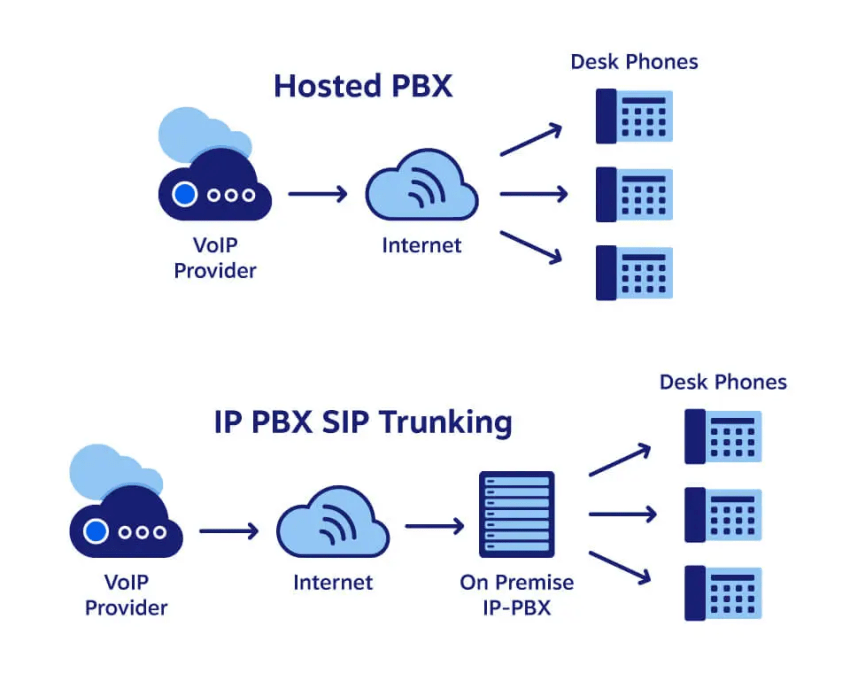
The reliability of on-premises phone systems is contingent on local infrastructure, hardware, and maintenance. And though it isn’t dependent on the internet, it is susceptible to local power outages.
Which Solution Is Right for Your Business?
We already know that on-premise solutions typically come with large upfront costs and limited features. But that doesn’t mean you should rule them out completely; this option is still favored by some companies.
But do you absolutely need an on-premise system? Or can you make the switch to the cloud? Ask yourself these four questions to help you decide what’s best for your business.
1. How much can you afford to spend?
Arguably the most important thing to consider when choosing between hosted VoIP and on-premises phone systems is the cost.
Both providers will give you an upfront cost and monthly service fee when you inquire. But it’s worth noting that, overall, VoIP is much cheaper than premise based phone systems when it comes to total cost of ownership.
Sure, there’s a monthly fee to stay connected, but maintenance costs aren’t as high because it’s managed by your provider remotely without disrupting service. You don’t need IT coming in to a physical office for updates or repairs to the network.
The set-up cost for VoIP is cheaper, too, because you can use the devices you’ve already got. Remote employees’ personal phones can double as work phones. You can also retrofit your current analog phones or PBX setup by using a VoIP adapter.
2. Do you have a remote team?
It’s harder for a remote team member to call into a premise-based phone system. Connections are made physically inside the office from data center to device. That makes them a bad choice for businesses with remote teams.
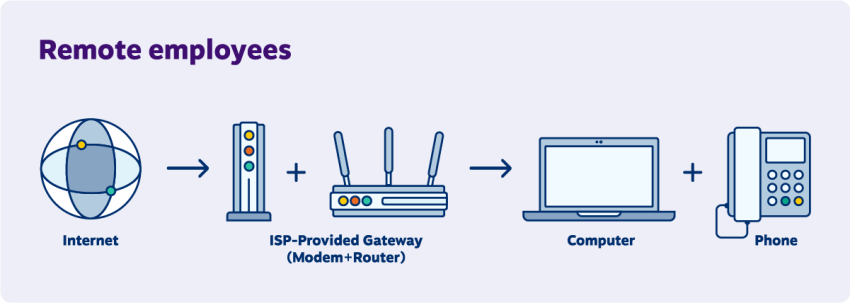
However, cloud solutions allow remote teams to thrive. Employees can use this system from anywhere in the world to access their business phone system using Voice over IP. All they need is an internet connection with a strong enough bandwidth to make and receive business calls.
If you’re unsure whether or not your internet can handle VoIP, use our free network speed test to see if your connection meets recommended VoIP network requirements.
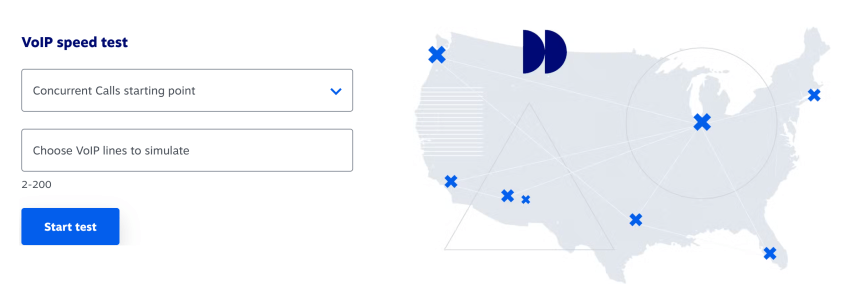
And the best part? Call quality is noticeably better. VoIP solutions send and convert voice waves into digital files using the internet. It has twice the bandwidth of a typical analog phone call, even if the end-user isn’t using a VoIP system themselves.
3. Do you plan to expand your team?
A hosted phone system is more scalable than an on-premise alternative. That’s because you don’t need extra wire lines connected to your on-premise data center.
Instead, your hosted service provider can add another line to your online account. Any new team member can have an account created within minutes. And since they use the technology they’ve already got, devices like their work laptop or mobile phone can double as their business communications tool.
This means that expansion of the system makes hosted VoIP superb for growing teams. If you plan to expand your contact center or hire new employees within the next few years, call management is easier with a hosted provider.
4. How much control do you need?
Do you need complete control over your entire network? If so, an on-premise solution might suit your business needs better. You’ve got direct control over the system when it’s inside your office, and you’ll have access to an in-house IT team that probably has a superior understanding of the nuances of your network.
But if you’d prefer a hands-off approach to managing and maintaining your business phone system, a hosted solution might be ideal. Your provider is responsible for all the upkeep and, since there’s no additional equipment in your office, all you need to do is update the software on the devices you’re using. It’s that simple.
Choosing a Business Phone System Provider
Now it’s time to choose an on premise phone system or a hosted phone system provider to give you the perfect phone service you need.
Remember, there are four key factors to consider when choosing any new phone service provider:
- Reliability: How often does your cloud provider have technical problems or outages? The more uptime, the less chance you have of your business phone system shutting down. (Nextiva’s business voice network connected more than 2 billion calls last year!)
- Accreditations: Check that your provider is ISO/IEC 27001 certified, and SOC-2 and PCI compliant. This shows that their network is secure. If you’re working in specific industries like healthcare, also make sure that your hosted VoIP provider is HIPAA compliant.
- Security: Both on-premise and VoIP phone systems are secure on the whole. Check that your provider is committed to security by asking for their security protocols, and see if they explain how to report a vulnerability.
- Important features: Check if your provider offers features that make the system more powerful for your employees. This can include voicemail-to-text, call recording, real-time analytics, and so much more. If you need help breaking down all the different VoIP features, we wrote a guide on the 40+ features to consider in your research.
Once you’ve found a business phone provider that ticks off all four of these key factors, book a demonstration with each. It’s the best way to fully understand what they’re offering and ask any questions about unified communications features your business needs.
Nextiva Is Your Cloud-Based Phone System Solution
Hosted VoIP will be the best choice for some businesses. Others might get more value from an on-premise solution that’s in the office.
But after reading this article and answering the questions we presented, you should have a much clearer idea of what’s best for your particular business.
If you’ve decided that a cloud-based phone system is the option for you, get in touch with Nextiva. We’ve helped thousands of businesses of all sizes create a strong, robust, and reliable VoIP network with almost-perfect uptime.
We’re rated the best business phone system by U.S. News & World Report for a reason.
The cloud phone system built for remote teams.
Move your current PBX to the cloud or get a hosted VoIP system with superpowers.
Premise and Cloud Phone System FAQs
A premise-based phone system (or on-premise phone system) is a traditional telephone system where the hardware such as a Private Branch Exchange (PBX) is installed and maintained at the physical location of a business. This system requires dedicated phone lines, and the business is responsible for the management and maintenance of the equipment.
A hosted cloud phone system is a telephony solution where the phone system is hosted and managed by a service provider in the cloud. This means that the phone system’s infrastructure, like servers and data storage, is located off-site at the provider’s data centers. Users access the phone system over the internet, allowing for flexibility, scalability, and often reduced costs compared to traditional on-premises phone systems.
The cost of an on-premise phone system can vary based on factors like the size of the business, the number of phone lines needed, and the specific features required. Generally, the cost is between $500-$1,000 per user. Keep in mind that there are also ongoing maintenance costs.
The cost of a cloud phone system varies depending on several factors, including the provider, the features and services included, and the number of users. Generally, costs are structured as monthly per-user fees, which can range from $15-$60 or more per user per month. Additional costs may include set-up fees, charges for additional features, and potential long-distance or international call rates.
PBX (Private Branch Exchange) and VoIP (Voice over Internet Protocol) are two different types of phone systems:
PBX: A PBX system is a private telephone network used at an organization that allows for both internal and external communication. Traditional PBX systems use analog phone lines.
VoIP: VoIP technology allows you to make phone calls over the internet instead of traditional analog phone lines.
PBX and PABX refer to similar technologies with a slight difference:
PBX (Private Branch Exchange): This is a general term for a private telephone network used within a business.
PABX (Private Automatic Branch Exchange): This is a PBX with automated call routing capabilities. In other words, it doesn’t need manual assistance from a switchboard operator.
The terms hosted VoIP and cloud VoIP are pretty similar, with a slight difference:
Cloud VoIP: This means that the VoIP services are delivered via cloud computing, i.e. over the internet. Cloud VoIP systems are designed to be highly scalable and flexible, and offer seamless integration with other cloud-based services.
Hosted VoIP: This generally refers to a VoIP phone system, but specifically one where the infrastructure is hosted by a third-party provider.


















 VoIP
VoIP 

